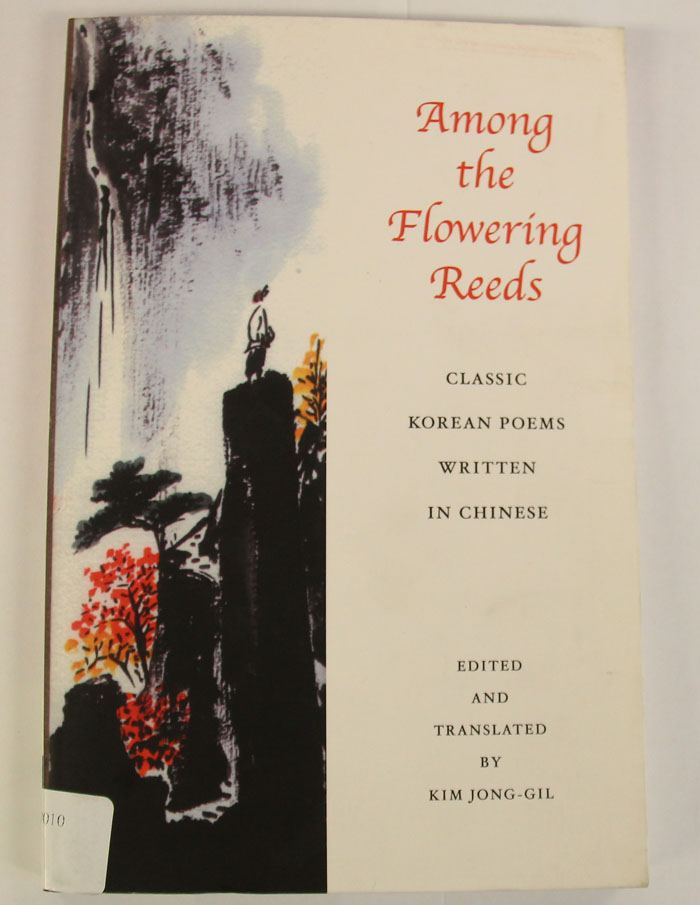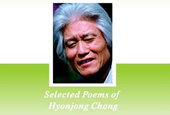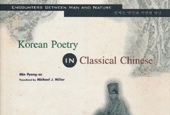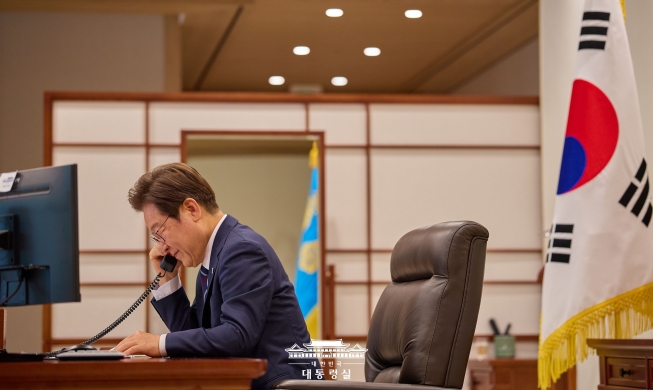Until the early 20th century, many Korean aristocrats often wrote poetry in classical Chinese characters, including many sijo, a standardized form of poetry.
Chinese versification was regarded as an important discipline for Confucian scholars and it was a channel of communication for academic information and opinions.
Kim Jong-gil, an honorary professor of English literature and a poet, translated one hundred Korean poems written in classical Chinese, including many sijo. The collection, "Among the Flowering Reeds," was published in December 2002 by the U.S.-based White Pine Press. The book contains poetry from different eras in chorological order, from those by Choe Chi-won (857-?), a renowned scholar from United Silla (668-935), to the one by Hwang Hyon (1855-1910), an independence activist.

The following is a poem written by Joseon King Danjong (r. 1452-1455) after he was exiled to Yeongwol in Gangwon-do (Gangwon Province).
Since I left the imperial palace like a resentful bird,
I have dragged my lonely shadow among blue mountains.
I beg for sleep night after night, but sleep won't come;
year after year passes in grief, but the grief doesn't end.
Singing stopped, the moon is pale over the peaks at dawn;
blood streamed, fallen petals are red in the spring valleys.
When heaven is deaf to the song of a nightingale,
why are a grieving man's ears so keen?
一自寃禽出帝宮
孤身隻影碧山中
假眠夜夜眠無假
窮恨年年恨不窮
聲斷曉岑殘月白
血流春谷落花紅
天聾尙未聞哀訴
何乃愁人耳獨聽
In this poem, King Danjong compares himself to a bird that is thrown out of the palace, flying from one mountain to another and singing all night long. The poem demonstrates the cruel reality and loneliness of the monarch, something which the king experienced firsthand.
The bird in question is commonly believed to be a cuckoo bird. There is a myth about the ancient Chinese king Yu Du, who was titled Wang-di, of the Shu Han (221-263), one of China's Three Kingdoms. He was defeated in war and died afterward, only to became a cuckoo bird. The cuckoo cries all night and its sorrowful sound stirs poetic inspirations. Thus, the cuckoo has appeared in many poems ever since.
The following is a sijo by Admiral Yi Sun-sin (1545-1598). He wrote the poem while watching the sea off Hansan Island, what is now near Tongyeong, Gyeongsangnam-do (South Gyeongsang Province).
Autumn light darkens over the sea;
wild geese fly high in the cold air.
As I toss about anxiously in the night
moonlight catches my bow and sword.
閑山島月明夜上戌 樓
撫大刀深愁時何處
一聲羌笛更添愁
The sijo shows Admiral Yi Sun-sin's determination and agony before going to war.
The book contains a couple of poems by Hwang Chin-i, who was a gisaeng during Joseon times, a Korean version of a geisha. Hwang left many poems about love, which was considered a taboo subject in Confucian Joseon society.
The following poem well-demonstrates the sorrow of parting and yearning.
My wish to see you is fulfilled only in dreams;
whenever I visit you, you visit me.
So let us dream again some future night,
starting at the same time to meet on our way.
相思相見只憑夢
儂訪歡時歡訪儂
願使遙遙他夜夢
一時同作路中逢
By Limb Jae-un
Korea.net Staff Writer
jun2@korea.kr

Chinese versification was regarded as an important discipline for Confucian scholars and it was a channel of communication for academic information and opinions.
Kim Jong-gil, an honorary professor of English literature and a poet, translated one hundred Korean poems written in classical Chinese, including many sijo. The collection, "Among the Flowering Reeds," was published in December 2002 by the U.S.-based White Pine Press. The book contains poetry from different eras in chorological order, from those by Choe Chi-won (857-?), a renowned scholar from United Silla (668-935), to the one by Hwang Hyon (1855-1910), an independence activist.

The poetry book "Among the Flowering Reeds" contains one hundred poems and sijo.
The following is a poem written by Joseon King Danjong (r. 1452-1455) after he was exiled to Yeongwol in Gangwon-do (Gangwon Province).
Since I left the imperial palace like a resentful bird,
I have dragged my lonely shadow among blue mountains.
I beg for sleep night after night, but sleep won't come;
year after year passes in grief, but the grief doesn't end.
Singing stopped, the moon is pale over the peaks at dawn;
blood streamed, fallen petals are red in the spring valleys.
When heaven is deaf to the song of a nightingale,
why are a grieving man's ears so keen?
一自寃禽出帝宮
孤身隻影碧山中
假眠夜夜眠無假
窮恨年年恨不窮
聲斷曉岑殘月白
血流春谷落花紅
天聾尙未聞哀訴
何乃愁人耳獨聽
In this poem, King Danjong compares himself to a bird that is thrown out of the palace, flying from one mountain to another and singing all night long. The poem demonstrates the cruel reality and loneliness of the monarch, something which the king experienced firsthand.
The bird in question is commonly believed to be a cuckoo bird. There is a myth about the ancient Chinese king Yu Du, who was titled Wang-di, of the Shu Han (221-263), one of China's Three Kingdoms. He was defeated in war and died afterward, only to became a cuckoo bird. The cuckoo cries all night and its sorrowful sound stirs poetic inspirations. Thus, the cuckoo has appeared in many poems ever since.
The following is a sijo by Admiral Yi Sun-sin (1545-1598). He wrote the poem while watching the sea off Hansan Island, what is now near Tongyeong, Gyeongsangnam-do (South Gyeongsang Province).
Autumn light darkens over the sea;
wild geese fly high in the cold air.
As I toss about anxiously in the night
moonlight catches my bow and sword.
閑山島月明夜上戌 樓
撫大刀深愁時何處
一聲羌笛更添愁
The sijo shows Admiral Yi Sun-sin's determination and agony before going to war.
The book contains a couple of poems by Hwang Chin-i, who was a gisaeng during Joseon times, a Korean version of a geisha. Hwang left many poems about love, which was considered a taboo subject in Confucian Joseon society.
The following poem well-demonstrates the sorrow of parting and yearning.
My wish to see you is fulfilled only in dreams;
whenever I visit you, you visit me.
So let us dream again some future night,
starting at the same time to meet on our way.
相思相見只憑夢
儂訪歡時歡訪儂
願使遙遙他夜夢
一時同作路中逢
By Limb Jae-un
Korea.net Staff Writer
jun2@korea.kr
Most popular
- Business Survey and Economic Sentiment Index (ESI) for June 2025
- ROKG position on flood prevention measures along the Imjin River
- KDCA’s Standards for the National Reference Laboratory for Infectious Diseases: A First Step Toward
- MOFA Spokesperson’s Statement on Announcement of Ceasefire between Israel and Iran
- BOK Launches Redesigned English ECOS Website



